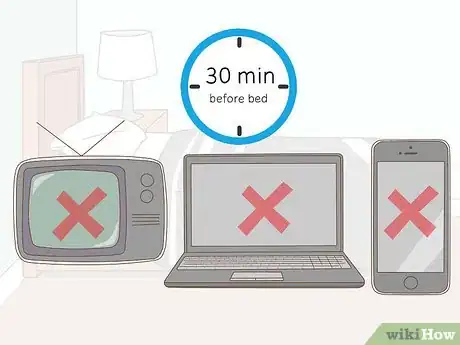This article was co-authored by César de León, M.Ed. and by wikiHow staff writer, Kyle Hall. César de León is an Educational Leadership Consultant and currently serves as an Assistant Principal for the Austin Independent School District in Austin, TX. César specializes in education program development, curriculum improvement, student mentorship, social justice, equity leadership, and family and community engagement. He is passionate about eradicating inequities in schools for all children, especially those who have been historically underserved and marginalized. César holds a Bachelor’s degree in Education and Biology from Texas State University and a Master’s degree in Educational Leadership from The University of Texas at Austin.
There are 9 references cited in this article, which can be found at the bottom of the page.
wikiHow marks an article as reader-approved once it receives enough positive feedback. In this case, 86% of readers who voted found the article helpful, earning it our reader-approved status.
This article has been viewed 70,741 times.
Regularly being late to school can take a toll on your attendance record and upset your parents and school administrators. Fortunately, there are lots of things you can do to save time in the morning and get to school before the bell rings. By preparing for school the night before, sleeping well, and getting up and out the door faster, you can be confident that you'll get to school on time.
Steps
Preparing the Night Before
-
1Pick out your outfit the night before to save yourself time in the morning. There’s nothing worse than getting ready for school and having no idea what you want to wear. To avoid the chaos in the morning, take a few minutes before bed to put together your outfit for the next day—including a shirt, bottoms, and shoes. Then, hang or lay out everything so it’s ready when you wake up.[1]
- Even if you wear a uniform to school, you can still put all your clothes in one place and double check that they’re wrinkle-free.
-
2Pack your lunch so you don’t have to worry about it before school. Then, you can just toss it in your backpack in the morning. If your lunch needs to be chilled, you can still prepare it in advance and store it in the fridge overnight.[2]
- If you usually buy lunch at school, put your lunch money on the counter the night before so you can easily grab it in the morning.
- If you're looking for easy, healthy lunches you can prepare in advance, try peanut butter and jelly sandwiches, bagels with cream cheese, or turkey and cheese sandwiches. Don't forget to pack a couple sides, like fruit, trail mix, carrots, or crackers.
Advertisement -
3Get your backpack ready to go so you can just grab it on your way out the door. Searching for loose papers and notebooks before school can be hectic. By organizing everything in your backpack the night before, you’ll have one less thing to worry about in the morning.[3]
- Keep your backpack in a really noticeable spot, like next to the front door or on your desk in your room, so you don’t have to look for it in the morning.
-
4Finish all your homework so you don’t have to do it in the morning. You might be tempted to finish your homework while you’re getting ready for school, but that might not be the best idea. If you get stuck on something or it ends up taking longer than you expected, you might end up being late. Instead, try to have it done the night before.[4]
- When you’re finished with your homework, don’t forget to put it in your backpack right away. That way, you won’t forget it or have to go looking for it in the morning.
-
5Shower at night so you don’t have to before school. Showering can take up a lot of time in the morning, especially when you’re a little groggy after just waking up. If you shower at night, you won’t have to worry about it in the morning, and you’ll still feel clean and fresh for school.[5]
Getting a Good Night’s Sleep
-
1Make it a priority to get to bed on time. If you habitually run late for school, pay attention to whether there's anything that's keeping you up late at night. Things like playing video games, babysitting, or even working an after-school job can keep you up late, but it's very important that your education comes first.[6]
- If other priorities are interfering with your schoolwork, talk to your parents about how you might be able to reschedule things so you can get enough sleep for school.
-
2Don’t drink caffeinated beverages after 3 in the afternoon. Caffeinated drinks like coffee and tea can give you a helpful morning or mid-day boost, but if you drink them too late in the day, they can actually prevent you from sleeping soundly. By limiting yourself to caffeine before 3 PM, you’ll have enough time to wind down and sleep well throughout the night.[7]
- Coffee and tea aren’t the only beverages with caffeine in them. Sodas and sports drinks can also have caffeine, so always check labels or look it up online if you're not sure.
-
3Avoid looking at screens for at least 30 minutes before you go to bed. The lights from screens signal to your body that it’s not time for sleep yet, which can keep you up at night. Instead of scrolling on your phone, using your computer, or watching TV before bed, try doing a relaxing, screen-free activity instead, like reading a book or drawing.[8]
- If you need a reminder, set an alarm 30 minutes before your bedtime. When the alarm goes off, you’ll know it’s time to put away screens for the night.
-
4Develop a bedtime routine so your body knows when it’s time to wind down. A good bedtime routine can make it easier to fall asleep at night. Also, going to sleep at the same time every night will help you get a better night’s sleep. Try to choose a bedtime and stick with it. Then, choose 1 or 2 relaxing activities you can do right before bed every night, like taking a bath, reading, or sipping on some decaffeinated tea.[9]
- If you’re between 6 and 12 years old, try to get 9-12 hours of sleep every night.
- If you’re between 13 and 18 years old, try to get 8-10 hours of sleep every night.
-
5Keep your room at a comfortable temperature while you sleep. It's hard to sleep soundly when you're too hot or cold. If your room is too hot at night, try turning on a fan or opening up a window to let a breeze in. Alternatively, if it’s too cold in your room, try sleeping with more blankets, and consider talking to your parents about getting a space heater. You can also ask your parents to adjust the thermostat so you sleep more comfortably.[10]
- Generally, you'll sleep best if your room is 60–67 °F (16–19 °C).[11]
-
6Turn all your bedroom lights off before bed so you sleep more soundly. Since light can interfere with your body's natural sleep cycle, keep it as dark as possible when you sleep at night. Turn off any screens that emit light too, like your TV. If light shines through your window at night, consider closing your blinds or curtains as well.[12]
- It’s OK to sleep with a dim night light if you need one. Just make sure the rest of the lights in your room are off.
-
7Try writing in a journal before bed if you’re feeling stressed or anxious. It can be hard to fall asleep when you have unpleasant thoughts swirling around in your head. By writing down your thoughts and feelings in a journal, you can help clear your mind so it’s easier to fall asleep.[13]
- You can journal about anything that’s weighing on your mind. For example, if you’re worried about a big test, write down the main points you need to remember so you can stop obsessing over them. Or, if you have a lot of assignments that are due soon, write out a quick to-do list for the upcoming days and weeks to get them off your mind.
Waking up on Time
-
1Avoid hitting the snooze button on your alarm clock. Hitting snooze might seem like a good idea at the time, but sleeping for an extra 10-20 minutes won’t actually make you feel any less tired. Since your body won’t have time to fall back into a deep sleep, you’ll wake up feeling more groggy after you snooze. Instead, to save yourself time, try to get up right when your alarm goes off in the morning.[14]
- Ideally, you should set your alarm for an hour to an hour and a half before you need to leave for school. That way, you'll have plenty of time to take a shower, get ready, and eat breakfast.[15]
- If you’re used to hitting the snooze button in the morning, it might take some time to break the habit. Just try your best to sit up and get out of bed immediately after your alarm goes off.
- Use an old-school alarm clock instead of your cell phone. That way, your alarm will still go off even if your phone isn't charged.[16]
-
2Move your alarm clock away from your bed so you have to get up to turn it off. That way, you won’t be able to hit snooze even if you’re tempted to. Once you’ve gotten out of bed and walked across the room, it will be a lot easier to get your day started.[17]
- Choose a spot that you won’t be able to reach from your bed, like a desk across the room or a far-away window sill.
-
3Ask for help if you can't wake up. If even an alarm clock can't get you out of bed, try asking your parents or siblings if they'd be willing to help wake you up in the morning.
- You could also ask an early-rising friend to call you each morning to make sure you're awake.[18]
-
4Turn your bedroom lights on and open your blinds right after you get up. Light signals to your body that it’s time to wake up, and the more light you expose yourself to in the morning, the faster you’ll stop feeling tired. By turning on all the lights right when you get out of bed, you'll wake yourself up and have an easier time getting ready.[19]
- There are even alarm clocks you can buy that have lights built into them. When the alarm goes off, the lights turn on, making it easier to wake up.
-
5Try splashing your face with cold water so you feel more awake. Cold water can shock your system and make you feel more alert. If you need a quick, easy pick-me-up right after you get out of bed, splashing your face with cold water can help.
- If you plan on showering before school, try turning the water to cold for 30 seconds right before you get out to help wake you up.
-
6Play your favorite music to help motivate you to start getting ready. Music can improve your mood and give you a burst of energy while you’re preparing for school. Try to choose upbeat, high-energy songs since they’ll wake you up better than slow, soothing music.[20]
- If anyone in your family is still asleep, listen to music using headphones so you don’t wake them up.
Getting out the Door
-
1Put your hair up if it’s long so you don’t have to worry about styling it. Styling your hair before school can take a lot of time. If it looks a little messy when you roll out of bed, pull it back into a ponytail or a bun. You can also quickly braid it. That way, you won’t feel as rushed getting out the door.
- If you have short hair and it’s messy, wet it down with water and run a brush or comb through it to quickly style it.
-
2Simplify your makeup routine if you wear any, or consider going barefaced. Like styling your hair, doing your makeup can take a while in the morning. If doing your makeup every morning is making you late to school, try using fewer products and eliminating steps in your routine. Or, if you’re comfortable, consider not wearing any makeup at all so it’s one less thing you have to worry about.[21]
- For example, you can simplify your eye makeup by skipping eyeshadow and eyeliner and just applying mascara.
- You can also speed up your routine by ditching foundation and just using concealer on any spots you want to cover up.
- If you usually fill in your eyebrows before school, try running a colored brow mascara through them instead, which will be faster than using powders or pencils.
-
3Choose quick, easy breakfast options that you can eat on the go. Avoid skipping breakfast to save time since it gives you energy for the school day. However, you might not have time for a full breakfast spread. Instead, have easy breakfast snacks, like fruit, yogurt, granola, or hard-boiled eggs.[22]
- To save yourself even more time in the morning, make your breakfast the night before. For example, you can make a breakfast burrito by wrapping scrambled eggs, potatoes, and meat in a tortilla. Then, wrap it in aluminum foil and store it in the freezer. In the morning, you can heat it up in the microwave and eat it while you're getting ready.
- If you’re running behind in the morning, you can eat your breakfast on the way to school to save yourself time.
-
4Plan on walking out the door a few minutes earlier than you need to. Whether you take the bus, walk, ride your bicycle, or get driven to school by your parents, having a few minutes of wiggle room will save you from being late if you’re running behind. Even if you oversleep a bit or take too long to get ready, you’ll have a few extra minutes before you actually have to be out the door.[23]
- For example, if the bus picks you up at 8, plan on heading to the bus stop at 7:50 every morning. That way, you have 10 extra minutes in case you ever need them.
Expert Q&A
Did you know you can get expert answers for this article?
Unlock expert answers by supporting wikiHow
-
QuestionHow can I stop running late for class?
 César de León, M.Ed.César de León is an Educational Leadership Consultant and currently serves as an Assistant Principal for the Austin Independent School District in Austin, TX. César specializes in education program development, curriculum improvement, student mentorship, social justice, equity leadership, and family and community engagement. He is passionate about eradicating inequities in schools for all children, especially those who have been historically underserved and marginalized. César holds a Bachelor’s degree in Education and Biology from Texas State University and a Master’s degree in Educational Leadership from The University of Texas at Austin.
César de León, M.Ed.César de León is an Educational Leadership Consultant and currently serves as an Assistant Principal for the Austin Independent School District in Austin, TX. César specializes in education program development, curriculum improvement, student mentorship, social justice, equity leadership, and family and community engagement. He is passionate about eradicating inequities in schools for all children, especially those who have been historically underserved and marginalized. César holds a Bachelor’s degree in Education and Biology from Texas State University and a Master’s degree in Educational Leadership from The University of Texas at Austin.
Student Mentor When students are habitually late for school, it's usually because they're staying up too late. Think about why you're going to bed late—are you playing games, doing homework, helping your family, or working a job? You may need to reevaluate your priorities. Your education is the most important thing when you're under the age of 18.
When students are habitually late for school, it's usually because they're staying up too late. Think about why you're going to bed late—are you playing games, doing homework, helping your family, or working a job? You may need to reevaluate your priorities. Your education is the most important thing when you're under the age of 18. -
QuestionWhy is it so hard to wake up?
 César de León, M.Ed.César de León is an Educational Leadership Consultant and currently serves as an Assistant Principal for the Austin Independent School District in Austin, TX. César specializes in education program development, curriculum improvement, student mentorship, social justice, equity leadership, and family and community engagement. He is passionate about eradicating inequities in schools for all children, especially those who have been historically underserved and marginalized. César holds a Bachelor’s degree in Education and Biology from Texas State University and a Master’s degree in Educational Leadership from The University of Texas at Austin.
César de León, M.Ed.César de León is an Educational Leadership Consultant and currently serves as an Assistant Principal for the Austin Independent School District in Austin, TX. César specializes in education program development, curriculum improvement, student mentorship, social justice, equity leadership, and family and community engagement. He is passionate about eradicating inequities in schools for all children, especially those who have been historically underserved and marginalized. César holds a Bachelor’s degree in Education and Biology from Texas State University and a Master’s degree in Educational Leadership from The University of Texas at Austin.
Student Mentor If you're having trouble getting out of bed, invest in a reliable alarm. Don't use your cell phone—if it dies or the power goes out, the alarm won't go off. Make sure to put the alarm away from your bed so you have to get up to turn it off, and set it for about an hour to an hour and a half before you have to be at school.
If you're having trouble getting out of bed, invest in a reliable alarm. Don't use your cell phone—if it dies or the power goes out, the alarm won't go off. Make sure to put the alarm away from your bed so you have to get up to turn it off, and set it for about an hour to an hour and a half before you have to be at school. -
QuestionHow do I avoid being late when I have to rely on someone else who is late?
 Community AnswerHave a talk with the chronically late person about how you're really trying to get to school on time and you need their help. Share some of these tips with them. If all else fails, you may have to try to find another way to school.
Community AnswerHave a talk with the chronically late person about how you're really trying to get to school on time and you need their help. Share some of these tips with them. If all else fails, you may have to try to find another way to school.
References
- ↑ https://www.parents.com/parenting/better-parenting/advice/6-no-fail-tips-to-get-kids-out-the-door-on-time-every-time/
- ↑ https://www.parents.com/parenting/better-parenting/advice/6-no-fail-tips-to-get-kids-out-the-door-on-time-every-time/
- ↑ https://www.care.com/c/stories/3198/15-tips-on-how-to-get-ready-for-school-quickl/
- ↑ https://www.care.com/c/stories/3198/15-tips-on-how-to-get-ready-for-school-quickl/
- ↑ https://www.care.com/c/stories/3198/15-tips-on-how-to-get-ready-for-school-quickl/
- ↑ César de León, M.Ed.. Educational Leadership Consultant. Expert Interview. 11 November 2020.
- ↑ https://kidshealth.org/en/kids/cant-sleep.html
- ↑ https://www.nhs.uk/live-well/sleep-and-tiredness/sleep-tips-for-teenagers/
- ↑ https://www.nhs.uk/live-well/sleep-and-tiredness/sleep-tips-for-teenagers/
- ↑ https://kidshealth.org/en/kids/cant-sleep.html
- ↑ https://www.sleep.org/articles/temperature-for-sleep/
- ↑ https://kidshealth.org/en/kids/cant-sleep.html
- ↑ https://kidshealth.org/en/kids/cant-sleep.html
- ↑ https://share.upmc.com/2018/02/tips-for-trouble-waking-up/
- ↑ César de León, M.Ed.. Educational Leadership Consultant. Expert Interview. 11 November 2020.
- ↑ César de León, M.Ed.. Educational Leadership Consultant. Expert Interview. 11 November 2020.
- ↑ César de León, M.Ed.. Educational Leadership Consultant. Expert Interview. 11 November 2020.
- ↑ César de León, M.Ed.. Educational Leadership Consultant. Expert Interview. 11 November 2020.
- ↑ https://www.webmd.com/sleep-disorders/ss/slideshow-wakeup-tips
- ↑ https://share.upmc.com/2018/02/tips-for-trouble-waking-up/
- ↑ https://www.cosmopolitan.com/style-beauty/beauty/how-to/a4887/20-ways-to-get-ready-faster/
- ↑ https://www.care.com/c/stories/3198/15-tips-on-how-to-get-ready-for-school-quickl/
- ↑ https://www.parents.com/parenting/better-parenting/advice/6-no-fail-tips-to-get-kids-out-the-door-on-time-every-time/



























-Step-13.webp)

-Step-14-Version-2.webp)

-Step-14-Version-2.webp)

-Step-11-Version-2.webp)
















































